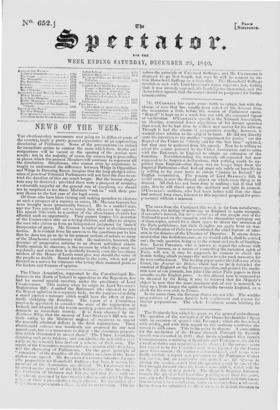21r. O'CoNNEr.r. has again conic forth to agitate, but with
the change of tone that has usually been noted on his descent from the mountains a little before the session of Parliament opens. " Repeal" is kept up as a word, but not with the autumnal vigour of vociferation. O'CoNsest.'s speech at the National Association, on Monday, contained fewer repetitions of his former speeches than usual, for he had time to collect new matter for his address. Though it had the charm of comparative novelty, however, it wanted close relation to the subject in hand. He did not directly state his intention to try another "experiment for justice" ere the Repeal of the Union be " finally and for the last time" agitated, but that may be gathered from his speech. Now he is willing to adopt the course pursued by the Ulster Association, and to unite with the Reformers in Engiend to obtain an extension of the franchise. Notwithstanding his recently oft-repeated but now supposed to be forgotten declarations, that nothing could be ex- pected from England—that there was no longer nothing from the Imperial Parliament—that Ireland must rely solely on herself—he is willing to try once more to obtain "justice to Ireland" by English cooperation. The passing of Lord STANLEY'S Bill, it would seem, is now the distant object on which every thing is to depend. All that has yet been done is nothing; but if that bill pass, then he will throw away the scabbard and tight in earnest. O'CONNELL'S auditors, who had been before told that the time had arrived long since, listened to this repeated proposal for post- ponement without a murmur.






















